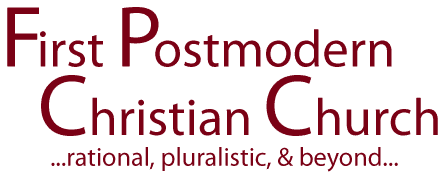
What is Postmodern?
What do we mean by “Postmodern?” In a nutshell, a postmodernist is generally suspicious of existing structures and systems (including beliefs). Postmodernists are comfortable holding beliefs lightly knowing they are simply stories, perhaps metaphors, to achieve a goal. Contradictions and paradoxes are to be expected. It is important to a postmodernist to question authority, to explore other perspectives, to be an independent thinker, and to rationally test assumptions against other points of view.
For those who are science-minded, particularly those who equate spirituality with a magical level of consciousness, many aspects of conventional Christianity have been in conflict with their rational world-view. In earlier eras, religion and scientific inquiry shared a search for Truth and for evidence of “God in the world.” As religion and science diverged and our world became more secularized, religion and science became polarized and those more science-minded found it more difficult to find a home within conventional religion. In some ways, science became the modern religion.
At the same time, some scientists, like Einstein and more recent quantum physicists, have found their discoveries in science to nurture an appreciation and awe in the workings of the physical world. At the quantum level, physics is becoming closely linked with metaphysics! According to David Ray Griffin, “Much postmodernism has drawn the conclusion that science, generally taken to be the paradigm of rationality, is itself rationally groundless.”
What is the rational mind to do with this? Where is there a spiritual home beyond conventional religion and conventional science? There was a time when science was called Natural Philosophy and science was a process to explore Spirit in action. Perhaps we have now come full circle in this postmodern era, to return with a bit of humility toward both the Truth of science and the Truth of spirituality, and to explore the interconnections that these two perspectives can make visible.
What is a postmodern Christian Church and why is this important? The Christian Church, theology, creeds, rituals, vestments, and structure are still strongly rooted in an authoritarian, pre-modern worldview. We acknowledge some more recent emerging pressures, tentative and explorative steps, and non-denominational structures that are beginning to shake the establishment. However, the conventional church has remained unmoving in the face of modern and post-modern developments. For us, this is the primary reason for the mass exodus from conventional churches. The tragedy for us is that the Christian message has been held captive by an antiquated delivery system that has not allowed the message to be reinterpreted and embraced by the emerging modern and postmodern experience.
This is the purpose of the First Postmodern Christian Church, to provide a community within which the Christian message can flow forward and be a relevant, inspiring source of wisdom in this era.
For a fuller explanation see https://firstpostmodern.org/2019/02/14/postmodernism/.
________________________________________
Griffin, D. R. (2003). Reconstructive theology. In K. J. Vanhoozer (Ed.), The Cambridge companion to postmodern theology: Cambridge University Press. See page 98.

